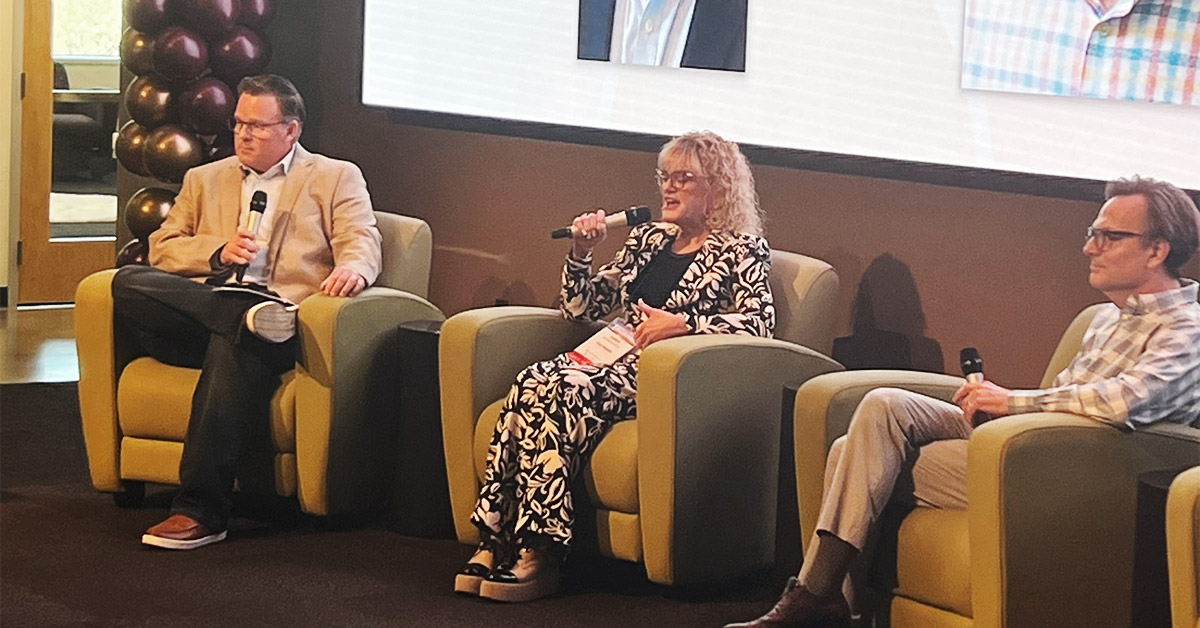
March 27, 2025
Turning Digital-Only Clients into Legacy Buyers (and Vice Versa)
At Borrell Phoenix earlier this month, Devlin Jefferson, WideOrbit SVP, Professional Services, had the privilege of moderating a panel discussion on the importance of converting digital-only and legacy clients into cross-platform buyers to boost both digital and core revenue streams. Sharing the stage with Devlin were Sean O’Mealy, Market Manager at Seven Mountains Media, and Leslye Schumaker, Chief Training Officer at Vici. What follows is a recap of their conversation.
The Shift in Media Revenue Trends
Digital revenue is on a steep upward trajectory, while traditional media growth is slowing or flat. Advertisers are increasingly recognizing the power of digital in achieving their campaign goals, leading to significant annual increases in digital revenue. But digital growth at the expense of traditional revenue is unsustainable. Media companies must find ways to ensure both revenue streams continue to grow.
The Cross-Selling Challenge
Many media companies have digital-only buyers who aren’t interested in traditional media. On the flip side, there are legacy advertisers who have yet to embrace digital. The question is: Are sales teams making a concerted effort to re-approach these buyers with cross-media solutions? An informal poll of session attendees revealed that some hybrid sales efforts do exist, but they haven’t been entirely effective in driving revenue growth across both channels.
So how can media companies continue to scale their digital revenue while ensuring that traditional revenue doesn’t stagnate?
A New Sales Approach: Moving Beyond Digital- or Linear-Only Strategies
Some companies employ digital-only sellers, while others have tried training traditional sellers to pitch digital. Neither strategy has proven to be a silver bullet for sustained revenue growth. The key may be in repositioning sales teams as marketing experts rather than product-driven sellers. Instead of leading with a specific product, they should focus on achieving the best outcomes for their buyers through a hybrid sales approach.
Educating Buyers on the Value of Cross-Platform Campaigns
For a hybrid sales approach to be effective, sales teams must be prepared to help existing linear-focused buyers understand the benefits of digital, and existing digital-focused buyers understand the benefits of linear, in achieving positive campaign outcomes. The benefits of a cross-platform campaign include:
Broader Reach:
Combining linear and digital asset types into a single cross-media campaign increases the probability of reaching target audiences where they are vs. a campaign that excludes TV or radio.
This balanced approach improves the likelihood of a positive campaign outcome for advertisers.
Increased Engagement:
Consumers are more likely to engage with brands they recognize as a result of multiple touchpoints, so supplementing traditional media with digital, or digital with traditional media, increases the number of touchpoints a consumer is likely to see.
This increases brand recognition and engagement, encouraging action when a consumer sees a digital ad for a brand they also saw on TV or heard on the radio, and vice versa, a result that will appeal to outcome-focused and attribution-oriented advertisers.
Implementing a Cross-Platform Ad Sales Strategy
To succeed, media companies need to shift from being purely media sellers to becoming full-fledged marketing solutions companies. This means offering a broad spectrum of products, including:
- Traditional media (TV, radio, print)
- Digital advertising (display, social, PPC)
- Events and sponsorships
- Podcasting and streaming
- Creative services
Achieving this transformation requires a culture shift from the top down. For teams to be successful at hybrid sales, they must have the full support of leadership.
Training Sales Teams to Sell Across Platforms
For cross-platform sales to be effective, every Account Executive (AE) needs to understand the value of both traditional and digital media. Sales teams should focus on selling the best solution for the buyer, rather than prioritizing a specific product. This requires a shift in mindset that leadership can support through:
- Training Programs: Equip sellers with knowledge on how different media channels contribute to campaign success.
- Sales Incentives: Encourage sellers to propose cross-media campaigns by rewarding hybrid sales.
- Leveraging Research and Data: Use insights from tools like Vici’s Audience Advertising Response reports to demonstrate how cross-media campaigns drive better results.
The Role of Technology in Hybrid Sales Success
The right tools can empower sales teams to seamlessly integrate digital and traditional ad sales. Some of the most critical capabilities include:
- Unified Proposal Tools: Sellers need platforms that allow them to pitch both digital and traditional media in a single proposal.
- Comprehensive Audience Data Access: Having multiple data sources (e.g., Nielsen, VideoAmp, Comscore) helps demonstrate cross-platform campaign effectiveness.
- Streamlined Fulfillment and Billing: A system that consolidates orders and invoices into a single, combined bill simplifies the buying process and builds advertiser trust.
Turning Sellers into Marketing Experts
By shifting to a cross-platform sales strategy, media companies can turn their teams into marketing experts who focus on delivering results rather than selling specific products. Organizational alignment, cultural transformation, and the right tools will enable media companies to drive revenue growth across both digital and traditional media. In today’s evolving media landscape, the ability to sell across platforms isn’t just a competitive advantage, it’s essential for long-term success.
WO Fusion makes it easy for media companies to manage, optimize, and execute cross-platform proposals and sales. Contact us to learn more.
